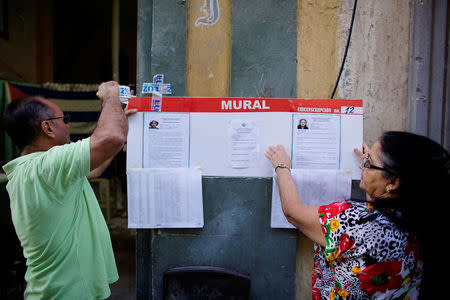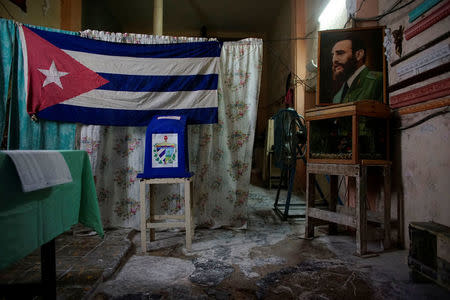Cuba holds municipal elections on road to Castro era’s end
By Marc Frank HAVANA (Reuters) - Cuba took another step on Sunday toward the end of the Castro era, with millions of residents placing paper ballots in cardboard boxes for ward delegates to municipal assemblies. The vote comes the day after the first anniversary of revolutionary leader Fidel Castro’s death and precedes another election early next year for provincial and national assembly deputies. The new national assembly, where 50 percent of the deputies must be ward delegates elected on Sunday, is expected on Feb. 24 to select a new president to replace Raul Castro, Fidel’s 86-year-old younger brother, who has said he will step down after serving two five-year terms. The Castro brothers have headed the government since the 1959 revolution. Raul Castro will remain head of the Communist Party until 2021, the only legal party in Cuba. Nearly 27,000 candidates are running for 12,515 ward positions in Sunday’s election, the only part of the electoral process that is contested publicly and with direct participation by ordinary Cubans. The results will be announced on Monday. The candidates for the provincial and national assemblies are nominated by commissions composed of representatives of Communist Party-controlled organizations, such as the trade union federation, then presented as a slate for a public vote. Those slates have had the same number of names as seats in previous elections. Fifty percent of those names must be ward delegates. The electoral cycle comes at a tricky time for the Caribbean nation as the revolutionary generation passes, an economic reform program appears stalled, aid from key ally Venezuela shrinks, and the Trump administration threatens. Yet candidates debated none of these issues before Sunday’s vote. First Vice President Miguel Diaz-Canel, who is expected to succeed Castro, lauded the electoral process and refused to speculate about his future. "Today is a day to talk about what we are doing and Fidel," he told reporters after casting his ballot. Asked about relations with the United States, he said Cuba remained interested in improving them, but reiterated its position that negotiations would have to be based on mutual respect and equality and without dictates. "The future depends on them, not us," he said. Campaigning is prohibited in Cuba, and candidates for the ward posts were nominated at neighborhood meetings based on their personal merits, not policy positions. They need not belong to the Communist Party, and many candidates are independents, but only a few government opponents have ever competed. "I am happy to vote, but I must say, like most young people I do not think it makes any difference," said a young woman, who requested anonymity because she holds an important government job. She added that there was an ongoing discussion on how to reform the electoral process and make government more responsive. This year a coalition of opposition groups ran more than 160 pre-candidates, but most were blocked by state security from nomination meetings, and none are running on Sunday. (Reporting by Marc Frank; Editing by Lisa Von Ahn)


